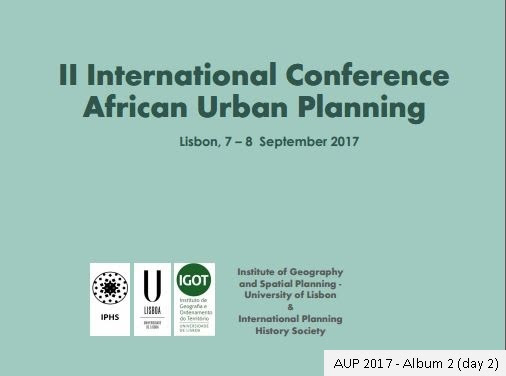By Adriano Biza
It was a great experience to attend the II International Conference on African Urban Planning. The event was organised by the Institute of Geography and Spatial Planning (IGOT) of the University of Lisbon in collaboration with International Planning History Society (IPHS) and was held in Lisbon, on 7th and 8th September 2017.
The conference brought together researchers and planners from academia, public and private sectors, and non-governmental organisations, in an effort to present and debate their research on African Urban Planning and to share knowledge, viewpoints, methods, research outcomes and policy ideas. The event was organised around four mains themes:
- The History of African Urban Planning, where my presentation was placed,
- Learning from African Urban Planning,
- Localizing Goal 11 of the SDGs and the New Urban Agenda, and
- Social and economic challenges and changes in African cities.
The venue included 34 sessions, 2 plenary sessions and 32 panels. The participants came from 32 countries, of which 14 were African countries and in the total of articles presented 30% were of PhD students.

II international COnference African Urban Planning.
I fully enjoyed the two days event with so many interesting sessions and discussions on various significant topics. On the first day of the conference, 7th October, I enjoyed the presentations by John Gold (Oxford Brookes University) and Susan Parnell (University of Cape Town). Jack Gold spoke about the establishment of Planning History and in which way it become institutionalized as a field of research. Susan Parnell talked about reducing risk in African cities, more especially on how and why the past matters politically, institutionally and technically. Both presentations and the discussions that followed were very enlightening of the state-of-art of research on African Urban Planning as well as about the challenges hampering current efforts of planning and governing African cities.
After these presentations I attended the History of African Urban Planning Panel 1 in which among the speakers were Robert Hume with the paper on ‘Cantonments and Townships – Urban Governance and Landscapes in British Colonial Africa’, Raymond Asomani-Boateng with the paper on ‘The Planning and Development of British Colonial City of Accra, Ghana’, Godfrey Anyumba with paper on ‘Colonial Kisumu, 1903-1963, as Mirror Image of Anthony Kings Construct of the British Colonial City’. All papers delivered by the speakers were very informative and insightful on their particular subjects, mainly by showing the tenacity of the past in current decisions making; the evolutions of practices, discourses and institutions that led to dual-type of segregated cities, the rationality which enfolded the establishment of African cities and postcolonial challenges of making African cities. The presentations were valuable and I took this chance reflect upon my own experience about Maputo in a comparative whereas sanitations appeared in all cases as having played a leading role in planning and shape the colonial cities.
In the second day of the conference, I presented my paper intituled ‘Sanitation and the politics of difference in Maputo, Mozambique’. There was a change on title and content in so far as the abstract submitted was about ‘Sanitary Equity and Challenges in Lourenço Marques’. In the same panel were more five speakers presenting papers about Maputo – Ana Roque on ‘Urban Planning, Development and Wellbeing in Lourenço Marques’; Elisário Miranda and Catarina Silva on ‘Spatial Segregation in Mozambique at the End of Colonialism’; David Morton on ‘The Bairro Clandestino Controversy in 1960’s Lourenço Marques’; and David Leite ‘Bairro Polana Caniço A: Lessons from its Configuration, (Self) Organisation and Space Appropriation’. This was a learning opportunity to present my research to other people. Other benefits including practising my communication skills, discussing ideas, and getting input about my work. The presentation went well and I had a good feedback from the audience. The people liked and praised a lot and they said that they were willing to read the entire article. There was no much time for questions and answers since people did not respect the 15/20 minutes to speak. There were more comments from the panel discussants (Thusile Mphambukeli and Jorgen Eskemose). The good comments from audience reinvigorated my esteem and allowed me to have a different look at my own work at a time which I was not so confident about what I was writing.
I enjoy building connections with people, mainly on professional level. There’s nothing better than meeting your contemporaries and sharing experiences. The conferences was a good way to meet people and other groups working in the same area and get new ideas for their research. It was a great chance to expand my horizons and learn ways of overcoming my own challenges. Lastly, attending this conference was a chance to break out of the Delft routine.





















